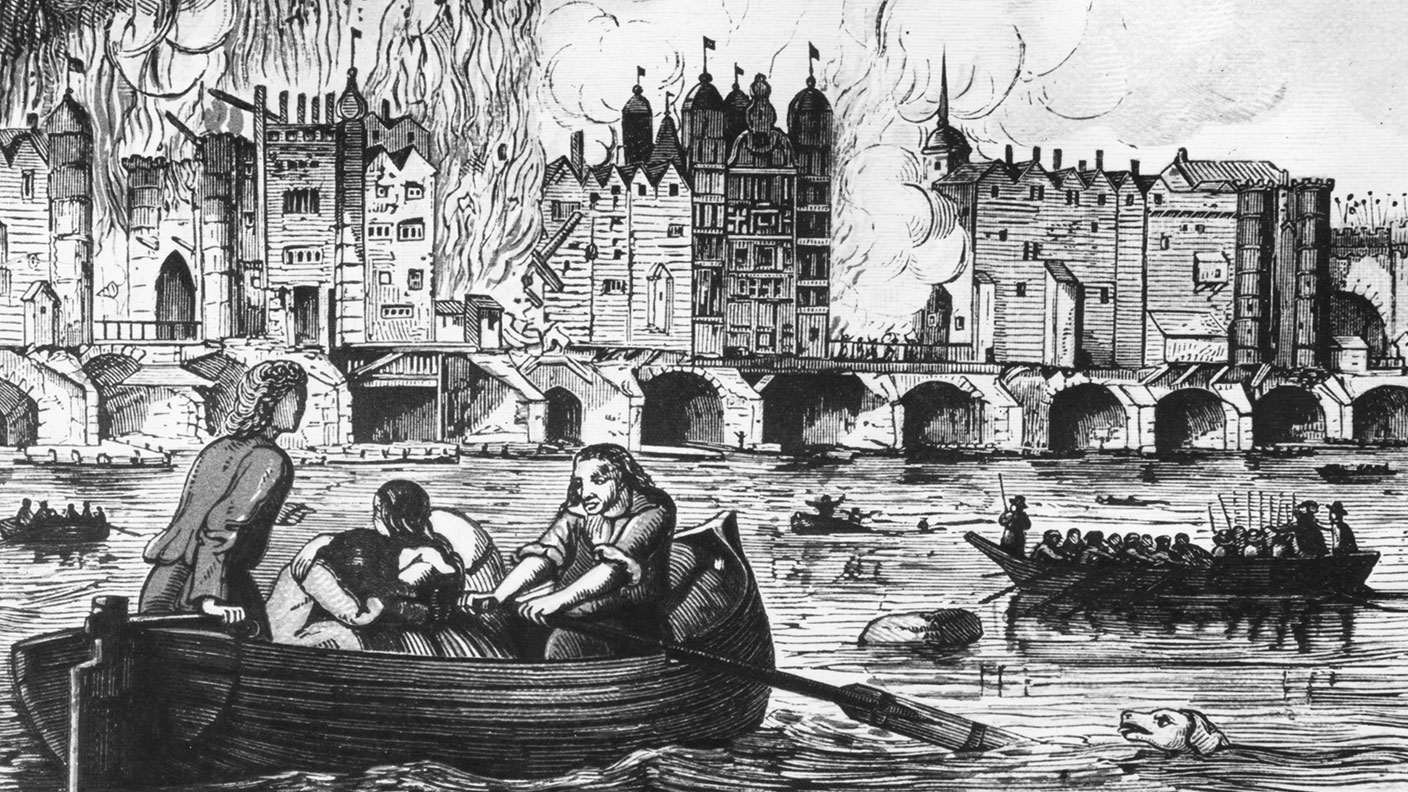2 September 1666: The Great Fire of London starts on Pudding Lane
On this day in 1666, the Great Fire of London started on Pudding Lane. The fire raged for four days, laying waste to much of the city.


Get the latest financial news, insights and expert analysis from our award-winning MoneyWeek team, to help you understand what really matters when it comes to your finances.
You are now subscribed
Your newsletter sign-up was successful
Want to add more newsletters?

Twice daily
MoneyWeek
Get the latest financial news, insights and expert analysis from our award-winning MoneyWeek team, to help you understand what really matters when it comes to your finances.

Four times a week
Look After My Bills
Sign up to our free money-saving newsletter, filled with the latest news and expert advice to help you find the best tips and deals for managing your bills. Start saving today!
The City of London – the area mainly inside the Roman walls – was the economic engine of the capital in the mid-17th century, just as it is today. So it was all the more devastating when, just after midnight on 2 September 1666, a spark from a bakery on Pudding Lane laid waste to the City and the surrounding neighbourhoods.
Thanks to a balmy summer and easterly winds, the fire spread rapidly through the wooden buildings. The flames didn't spare the shops selling luxury products on Cheapside, or the Royal Exchange, or the slums that ringed the city.
Over 13,000 houses went up in smoke and tens of thousands of Londoners, out of a population of half a million, were made homeless. But even as the flames engulfed street after street, many Londoners couldn't resist the opportunity to turn a quick profit.
MoneyWeek
Subscribe to MoneyWeek today and get your first six magazine issues absolutely FREE

Sign up to Money Morning
Don't miss the latest investment and personal finances news, market analysis, plus money-saving tips with our free twice-daily newsletter
Don't miss the latest investment and personal finances news, market analysis, plus money-saving tips with our free twice-daily newsletter
Boatmen charged punters extortionate prices to escape by river; the cost of hiring a cart soared to the equivalent of several thousand pounds in today's money; and anyone standing around was liable to be hired by the rich to serve as porters. Food also went up in price, with the cost of a loaf of bread doubling.
A combination of blowing up buildings, pulling down buildings and early, if ineffective, fire engines was used to fight the flames. After four days, the wind dropped, leaving the authorities to survey the burnt-out shells.
The cost of the Great Fire was put at £10m – a colossal sum considering the annual income of London was only around £12,000. A special levy on coal imports helped pay for the repairs.
Fearing a rebellion by the dispossessed (London was still a hotbed of republicanism following the Civil War), King Charles II promised a relief effort.
In time, London rose up from the ashes to the designs set down by Sir Christopher Wren. It was a London of stone and brick. But the Great Fire also bestowed upon the City of London another blessing (or a curse depending on how you look at it) for out of the carnage rose the beginnings of the modern insurance industry.
Get the latest financial news, insights and expert analysis from our award-winning MoneyWeek team, to help you understand what really matters when it comes to your finances.

-
 Should you buy an active ETF?
Should you buy an active ETF?ETFs are often mischaracterised as passive products, but they can be a convenient way to add active management to your portfolio
-
 Power up your pension before 5 April – easy ways to save before the tax year end
Power up your pension before 5 April – easy ways to save before the tax year endWith the end of the tax year looming, pension savers currently have a window to review and maximise what’s going into their retirement funds – we look at how
-
 13 April 1960: the first satellite navigation system is launched
13 April 1960: the first satellite navigation system is launchedFeatures On this day in 1960, Nasa sent the Transit 1B satellite into orbit to provide positioning for the US Navy’s fleet of Polaris ballistic missile submarines.
-
 9 April 1838: National Gallery opens in Trafalgar Square
9 April 1838: National Gallery opens in Trafalgar SquareFeatures On this day in 1838, William Wilkins’ new National Gallery building in Trafalgar Square opened to the public.
-
3 March 1962: British Antarctic Territory is created
Features On this day in 1962, Britain formed the British Antarctic Territory administered from the Falkland Islands.
-
10 March 2000: the dotcom bubble peaks
Features Tech mania fanned by the dawning of the internet age inflated the dotcom bubble to maximum extent, on this day in 2000.
-
9 March 1776: Adam Smith publishes 'The Wealth of Nations'
Features On this day in 1776, Adam Smith, the “father of modern economics”, published his hugely influential book The Wealth of Nations.
-
 8 March 1817: the New York Stock Exchange is formed
8 March 1817: the New York Stock Exchange is formedFeatures On this day in 1817, a group of brokers moved out of a New York coffee house to form what would become the biggest stock exchange in the world.
-
7 March 1969: Queen Elizabeth II officially opens the Victoria Line
Features On this day in 1969, Queen Elizabeth II took only her second trip on the tube to officially open the underground’s newest line – the Victoria Line.
-
4 March 1519: Hernan Cortes arrives in Mexico
Features On this day in 1519, Hernan Cortes landed in Mexico before marching on the Aztec capital, Tenochtitlan.